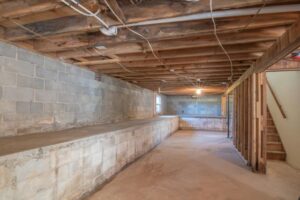
Welcome to the ultimate guide on basement construction. Whether you’re looking to expand your living space, create a home office, or add value to your property, building a basement is an exciting project that requires careful planning and consideration. Before you start breaking ground, it’s essential to understand the key factors that will ensure a successful and functional basement. If you are interested on sustainable cellar construction, read the article from Energieheld. From obtaining permits to addressing moisture control and everything in between, we’ve got you covered. So grab your hard hat, and let’s dive into the world of basement construction.
Building Codes and Permits
 When it comes to basement construction, one of the first steps you must take is to familiarize yourself with building codes and obtain the necessary permits. Building codes are regulations set by local authorities that ensure safety, structural integrity, and adherence to specific standards. Before breaking ground on your basement project, it’s crucial to research and understand the building codes in your area. These codes cover various aspects such as fire safety, electrical wiring requirements, ceiling height regulations, egress windows for emergency exits, and more. Familiarizing yourself with these codes will help you design a basement that meets all legal requirements. Next up is securing the required permits.
When it comes to basement construction, one of the first steps you must take is to familiarize yourself with building codes and obtain the necessary permits. Building codes are regulations set by local authorities that ensure safety, structural integrity, and adherence to specific standards. Before breaking ground on your basement project, it’s crucial to research and understand the building codes in your area. These codes cover various aspects such as fire safety, electrical wiring requirements, ceiling height regulations, egress windows for emergency exits, and more. Familiarizing yourself with these codes will help you design a basement that meets all legal requirements. Next up is securing the required permits.
Purpose and Design
One of the most critical factors when constructing a basement is the purpose and design. Before breaking ground, it’s essential to have a clear understanding of how you plan to use the space. Will it be an extra living area, a home office, or a dedicated entertainment zone? The purpose of your basement will dictate its layout and overall design. For example, if you plan on creating additional living space, you’ll need to consider factors such as room size, ceiling height, and access points. On the other hand, if you envision a home gym or workshop in your basement, considerations like lighting and storage become vital.
Foundation and Structure
 When it comes to basement construction, the foundation and structure are arguably the most critical elements. The foundation provides stability for your entire home, while the structure ensures that everything is built to code and can withstand the test of time. You need to consider the type of foundation suitable for your project. Common options include poured concrete walls or block walls filled with concrete. Each has its advantages and disadvantages, so it’s essential to consult with a professional before deciding. Next, think about how deep the foundation should go.
When it comes to basement construction, the foundation and structure are arguably the most critical elements. The foundation provides stability for your entire home, while the structure ensures that everything is built to code and can withstand the test of time. You need to consider the type of foundation suitable for your project. Common options include poured concrete walls or block walls filled with concrete. Each has its advantages and disadvantages, so it’s essential to consult with a professional before deciding. Next, think about how deep the foundation should go.
Moisture Control
Moisture control is a crucial factor to consider when constructing a basement. Excessive moisture can lead to various issues, such as mold growth, wood rot, and damage to the foundation. To begin with, proper drainage is vital. Ensure that the ground slopes away from your foundation to prevent water from seeping into the basement. Additionally, installing gutters and downspouts can help redirect rainwater away from the foundation.
Lighting and Ventilation
 Lighting and ventilation are crucial to consider when planning a basement construction project. Adequate lighting can transform a dark, dingy space into a bright and inviting area, while proper ventilation ensures air circulation and prevents the buildup of moisture or stale air. When it comes to lighting, natural light is always preferred. Incorporating windows or window wells in your basement design will bring in sunlight and create an illusion of space. However, if natural light is limited or not feasible, installing artificial lighting fixtures strategically throughout the basement is essential.
Lighting and ventilation are crucial to consider when planning a basement construction project. Adequate lighting can transform a dark, dingy space into a bright and inviting area, while proper ventilation ensures air circulation and prevents the buildup of moisture or stale air. When it comes to lighting, natural light is always preferred. Incorporating windows or window wells in your basement design will bring in sunlight and create an illusion of space. However, if natural light is limited or not feasible, installing artificial lighting fixtures strategically throughout the basement is essential.
Undertaking a successful basement construction project requires careful consideration of various factors such as building codes & permit adherence, purposeful design, sturdy foundation & structure, efficient moisture control measures, and thoughtful lighting and ventilation. By considering these essential factors, you can ensure that your basement is not only a functional space but also a safe and enjoyable one for years to come. We hope that you have found this blog post helpful.…
